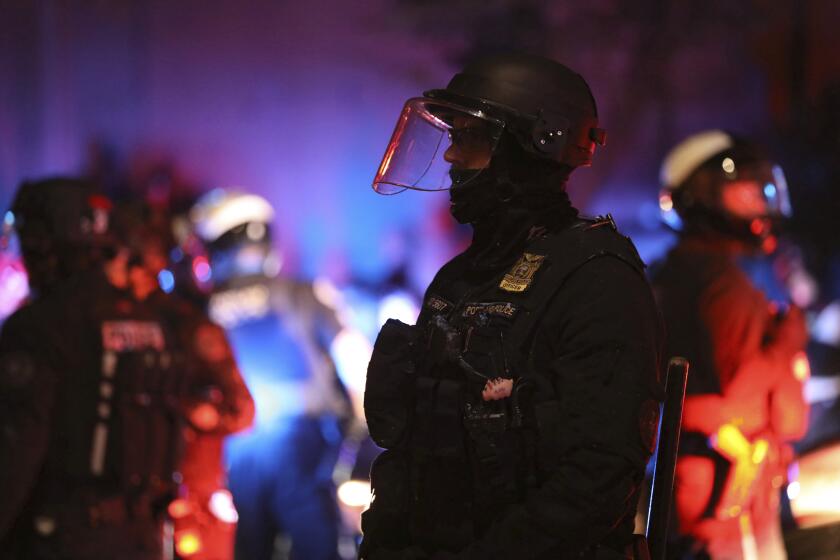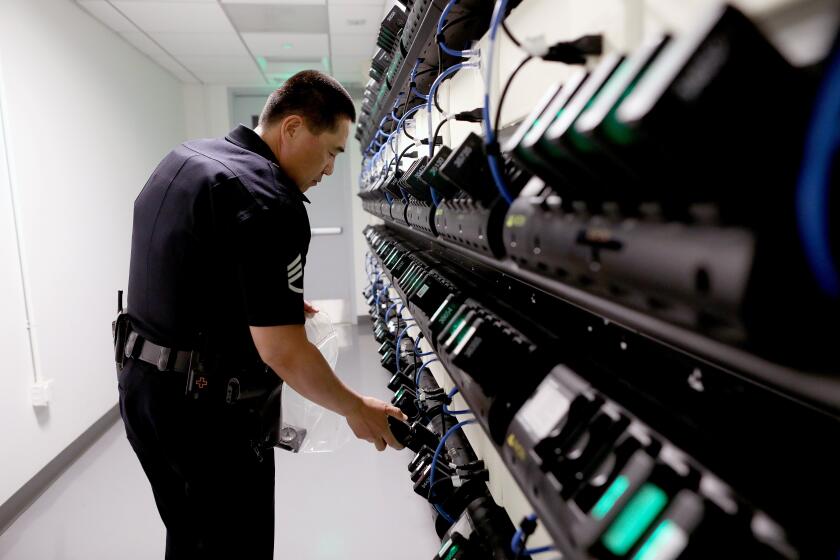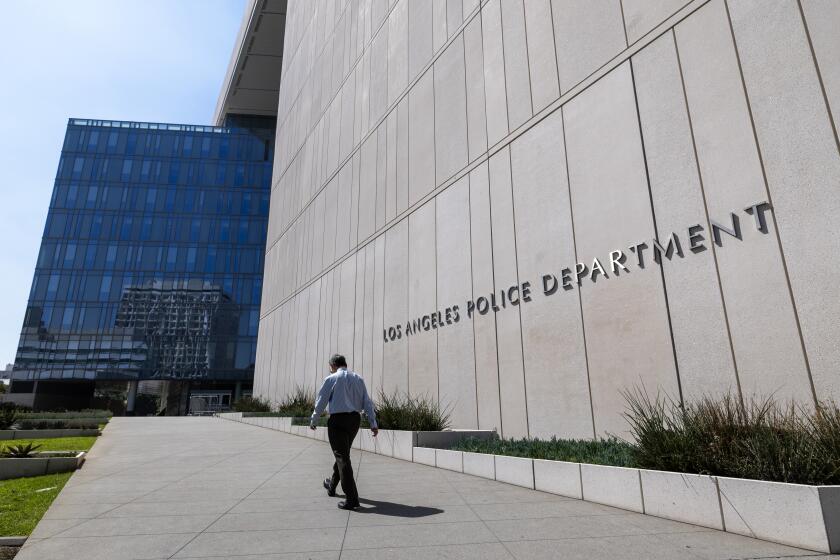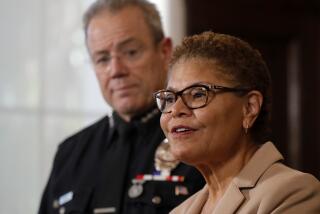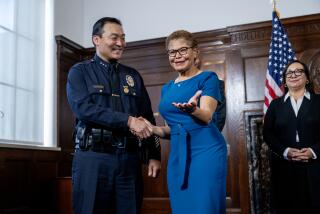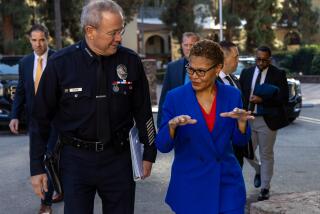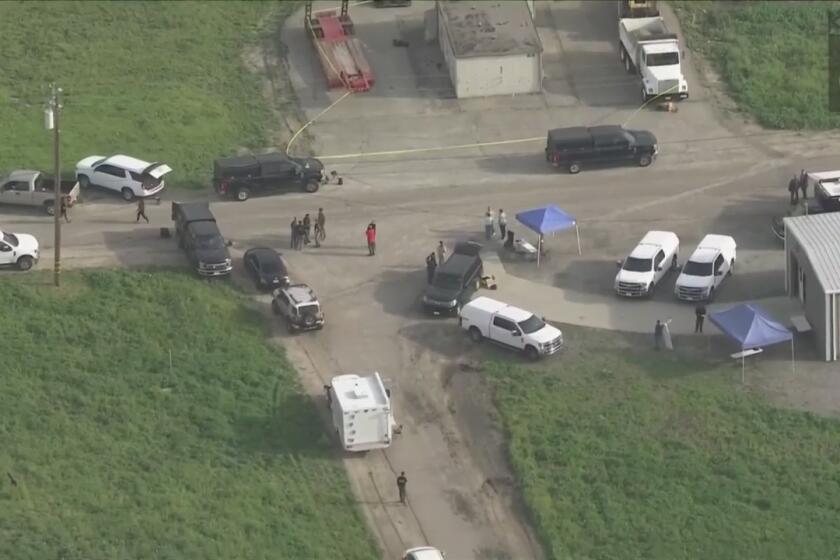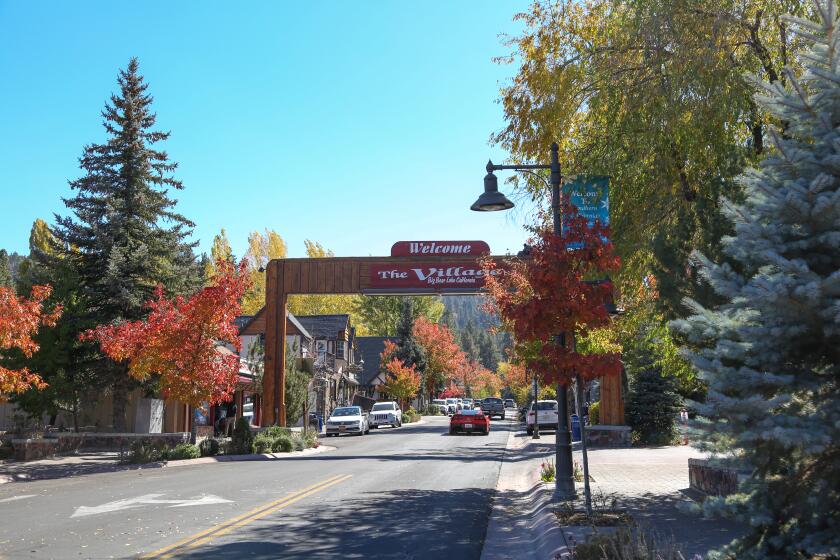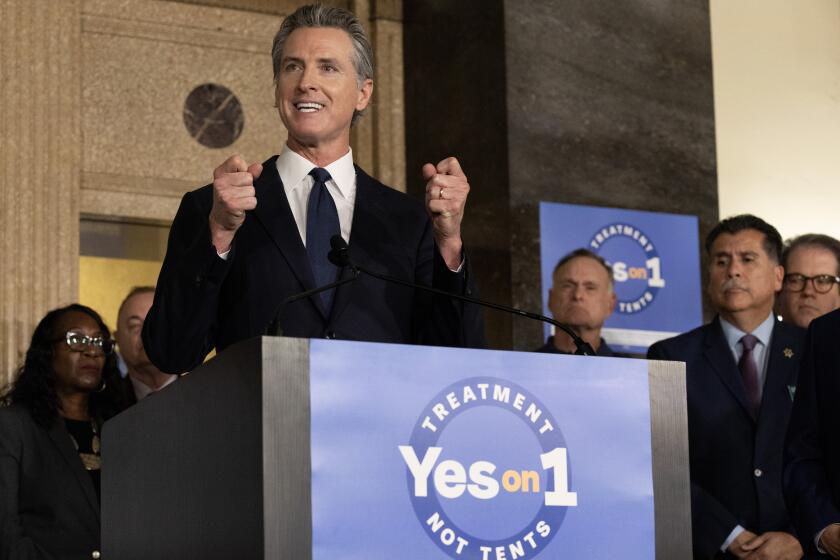LAPD can’t get rid of their bad cops. Here’s what they want to do about it
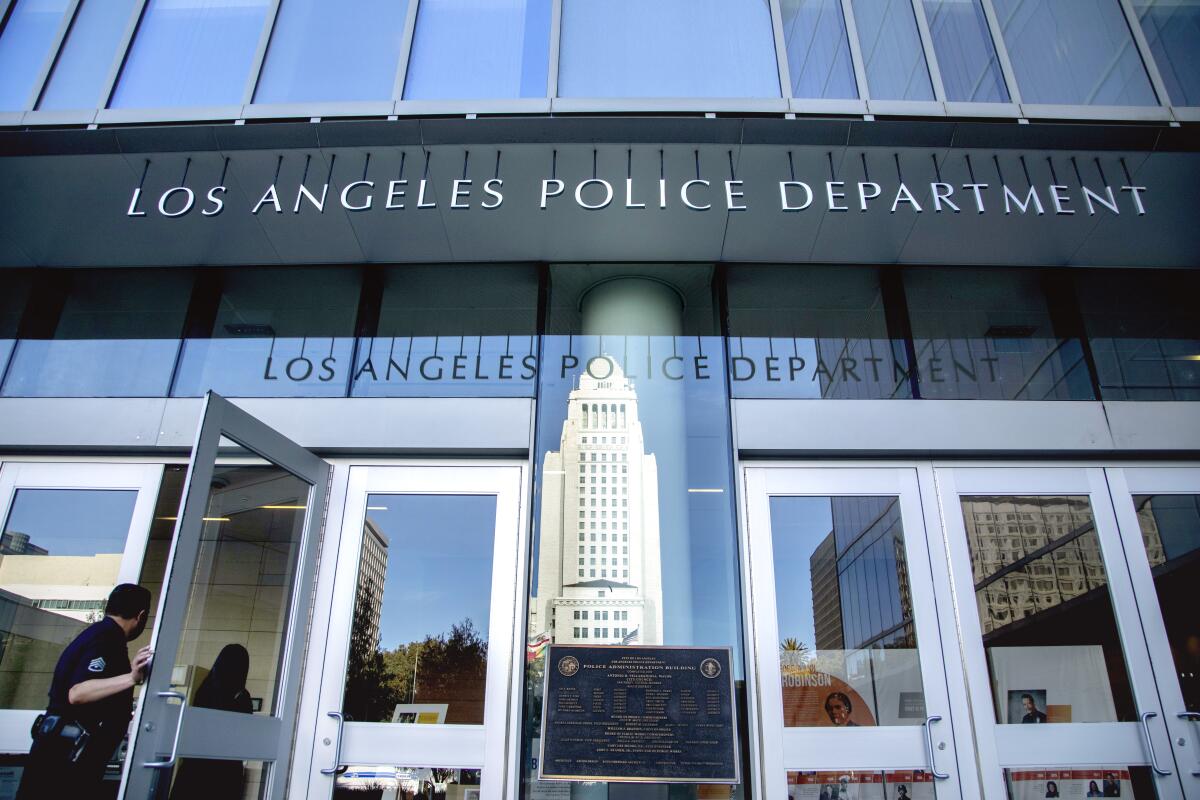
It read like a typical job listing for an attorney.
Successful candidates could expect to cross-examine witnesses, research case law and write briefs — with a starting salary that topped out at roughly $221,000.
But as the job description posted on the career website Indeed last year made clear, these wouldn’t be just any cases. The targets would be Los Angeles police officers whom department leaders wanted to fire, usually because they were suspected of lying or breaking the rules.
In the LAPD, firing a cop is not a straightforward proposition. Even in seemingly clear-cut cases of serious misconduct, the department’s often-criticized disciplinary system has led to outcomes in which those involved keep their jobs and continue collecting paychecks. Some are no longer allowed to patrol or interact with the public — relegated to administrative duties instead. LAPD officials estimate there are nearly 70 such officers currently on the payroll.
For months, department and city officials endorsed the idea that hiring lawyers to better argue termination cases was a step toward fixing what many feel has become a broken system. But some leaders are already renewing calls for a more radical overhaul.
“It’s not about finding ways to level the playing field — the playing field is flawed,” Councilmember Hugo Soto-Martinez said during a public safety committee meeting last month. “It’s abundantly clear that this system is … being taken advantage of.”
LAPD inspector general Mark Smith is a finalist for a job overseeing court-ordered reforms at the police department in Portland, Ore.
Under the city charter, the LAPD chief must send any officer facing termination to a three-member Board of Rights panel. The proceedings are kept secret under state law and play out like a mini-trial with evidence and witnesses. The accused officers are represented by an attorney supplied by the police union, and the department sends an advocate to argue its case.
Part of the problem, a 2022 report from the inspector general’s office suggested, is that the LAPD’s advocates are essentially cops with ad hoc legal training who are out of their league arguing against practicing attorneys with law degrees and bar licenses.
The other issue, the report said, is that officers can choose judgment from a panel of three civilians or two police officials and one civilian. In every case over the last two years, officers facing termination or long suspensions have opted for an all-civilian panel, which tends to deliver more lenient decisions, department officials said.
The hope was that by replacing the advocates in the disciplinary hearings with trained lawyers, the civilian panels could be persuaded to impose tougher discipline. The department pushed for more money in this year’s budget to hire attorneys to work on discipline cases. Four have been hired so far, and began training last month, according to officials.
But even as the LAPD increasingly brings more legal firepower to the table, the composition of the panels remains unchanged. Most civilian hearing examiners are former prosecutors, judges, clergy or arbitrators.
The boards determine whether the officer is guilty of an offense, and, if so, set the punishment. The police chief may accept or reduce the board’s penalty, but cannot increase it.
Of the 27 boards held in 2023 for officers the chief wanted to fire, the accused officer received lighter discipline in 11 cases, the department said. In two instances, the boards cleared the officers completely of wrongdoing. The rest were successfully terminated.
In the wake of a gang unit scandal and concerns about officers misconduct, LAPD leaders are considering whether to use artificial intelligence to analyze vast troves of officer body-cam footage.
There have been multiple cases in which the civilian boards have responded to allegations of dishonesty against officers by allowing them to remain on the force. The rulings amounted to a verdict of, “well, we felt they were lying on the stand but we thought they were nice guys,” Det. Marc Furniss, who runs the LAPD’s advocate unit, told the public safety committee.
What the civilians sometimes fail to understand is that officers accused of lying, for instance, can no longer testify in court and thus are required to work jobs with little to no contact with the public, Furniss said.
“You’re left with an employee collecting a pretty good paycheck that can’t work the field,” LAPD Deputy Chief Michael Rimkunas told the committee.
Such officers have, on average, 10 to 15 years on the job, he said, and typically make upward of $100,000 annually. Their credibility is so badly damaged, he said, that most cannot even work the front desk at a police station, presumably because the role would require taking reports that would later be used as evidence in court — which defense attorneys could challenge as being compromised.
“I’m embarrassed to even say that,” said Rimkunas, who runs the bureau that includes Internal Affairs. By his estimate, the all-civilian boards end up being more generous to officers “90-plus percent of the time” compared with hearings that include two police officials.
One explanation is that the civilian panels tend to be reluctant to take away a person’s livelihood after hearing about the officer’s life at the proceedings, which can include character witnesses, Rimkunas said. Other critics have argued that the civilians chosen lack the experience to be able to put themselves in the shoes of people impacted by police misconduct or excessive force.
In a follow-up interview, Rimkunas acknowledged that adding more lawyers to the equation may not be enough.
“Whether or not you have a city attorney that can argue a penalty or a department advocate, I’m not sure if it matters,” he said.
In recent years, cases abound of officers who narrowly avoided getting fired for misconduct, according to court documents and interviews. The list includes one officer who lied to department investigators after getting into an off-duty drunken brawl that led to an on-duty colleague shooting one of the alleged combatants. Another was said to have knocked an intoxicated woman out cold with a pair of punches because he alleged she reached for his badge and grazed his chin.
For months, someone has been filing anonymous complaints against members of the LAPD command staff under the pseudonym “Mel Smith.”
In both cases, the civilian panels acknowledged wrongdoing by the officers involved — but chose to suspend rather than fire them as called for by the police chief.
The fight to change the department’s system of disciplining officers has gone on for decades, with a succession of chiefs complaining about not having the power to fire bad officers. In the latest effort to overhaul the Board of Rights process, Soto-Martinez and Councilmember Tim McCosker — a former lobbyist for the Los Angeles Police Protective League — are considering a change that could potentially eliminate the all-civilian panels and give the police chief the authority to fire officers outright.
At the public safety meeting last month, council members voted to direct city agencies to study how other municipalities handle police discipline. The committee also asked the Police Commission to report back in 90 days on whether the newly hired attorneys were having an effect.
Broadening the chief’s authority would require a change to the city charter through a popular vote. It’s unclear whether any proposal to overhaul the Board of Rights process will be in place in time to make it onto the November ballot.
Fired officers would retain their ability to appeal their punishment under any proposal. But even so, the effort to toughen the disciplinary process is likely to face stiff opposition from the police union, which backed the passage of the charter amendment that gave officers the choice of picking an all-civilian panel.
Civilian board members, the union argued, are more likely to judge an officer’s actions dispassionately, without worrying about how a decision might affect their careers. Feelings that the department’s internal investigations are unfair have run deep in the LAPD for years, as have complaints that the system is beset by favoritism and more likely to overlook misconduct by officers of a higher rank and those who are well-connected.
Others have argued that many cases result in lighter penalties because the allegations against officers are circumstantial, not because of any issue with the boards themselves.
Meanwhile, activists have continued to push for more community oversight.
Pete White, executive director of the Skid Row advocacy group Los Angeles Community Action Network, said civilian boards don’t represent the public’s interests and lack transparency. But he’s equally wary of the idea of concentrating more power into the hands of the chief.
“The devil is always in the details on these things. I would agree that civilians that are sitting on the boards of rights now are not civilians … who the community could count on to hold cops accountable,” he said. “But I don’t believe that giving the ultimate power to the chief of police is the answer, because I don’t have to tell you that day in and day out, the chief is covering for officers.”
Times staff writer David Zahniser contributed to this report.
More to Read
Subscriber Exclusive Alert
If you're an L.A. Times subscriber, you can sign up to get alerts about early or entirely exclusive content.
You may occasionally receive promotional content from the Los Angeles Times.
